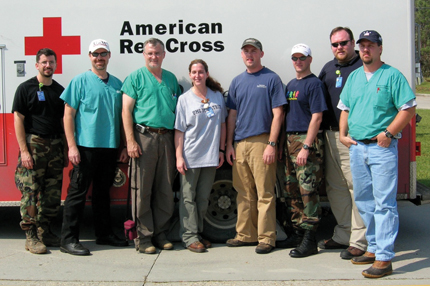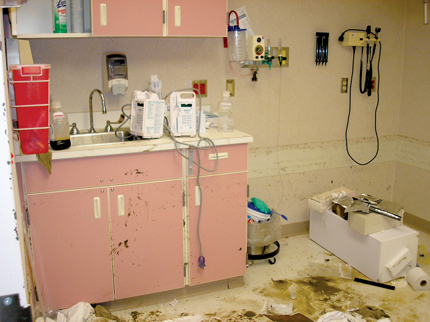A decade after the devastation, UMMC’s response still resonates
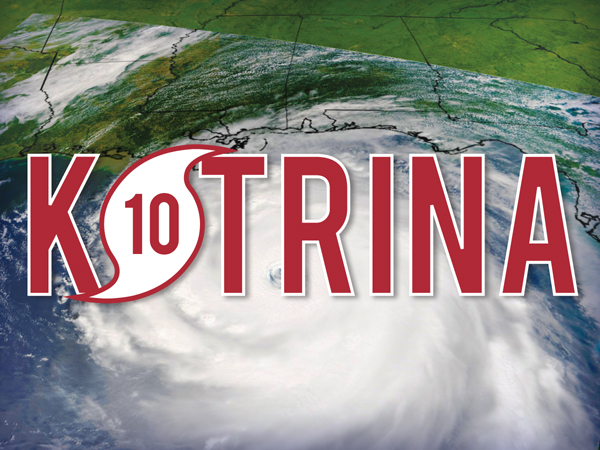
Published in News Stories on September 09, 2015
Jackson-area residents went about their Monday morning routines on Aug. 29, 2005, very few realized how their lives would be impacted by what had been unfolding on the Gulf Coast of Mississippi and Louisiana.
The National Weather Service had been issuing warnings about the size and strength of a hurricane named Katrina for days leading up to its eventual landfall, and evacuees from Pascagoula to New Orleans had begun appearing at temporary Red Cross shelters or camping out in parking lots around the capital city.
With the exception of those old enough to remember Hurricane Camille's rampage along the Mississippi coastline 36 years earlier, most Mississippians had never been confronted by a large-scale natural disaster. So when near-90 m.p.h. winds tore through Jackson, and shortages of fuel and the immediate loss of electricity kept many in the dark for more than a week, the need for dependable health-care services - for hurricane evacuees as well as local residents - was never more critical.
One constant throughout the chaos: the University of Mississippi Medical Center.

A changing Mission
A survey team of Mississippi State Department of Health and UMMC personnel, including Wilson, second from right, pause during its trip to the Mississippi Gulf Coast.
For a period of time when Katrina's storms swept through central Mississippi, if you were having an emergency, you were on your own.
"We had such strong winds through here that AMR couldn't respond to 911 calls," said Jonathan Wilson, UMMC chief administrative officer. "It wasn't safe to put an ambulance on the road."
Mississippi's initial response plan for Hurricane Katrina was to assess its impact, determine what the state's needs were, then obtain the necessary resources from the federal government. In the storm's wake, the Mississippi State Department of Health called on the Medical Center to help augment its staff in providing a Rapid Needs Assessment of hospitals that had been impacted by the hurricane.
"The problem was, the magnitude of the devastation in New Orleans overshadowed what was happening in Mississippi," Wilson said, "so all federal resources were going to New Orleans first, leaving us without all the help we needed."
Wilson, an ED nurse at the time, was among the eight-person team from UMMC - including six physicians and two nurses - that traveled to the coast along with DOH representatives to survey the damage. The majority of hospitals south of Interstate 20 had been impacted in some way. But none of the team members were quite prepared for what they saw on the Mississippi Gulf Coast.
Hancock County Medical Center in Bay St. Louis where Wilson was sent had been virtually destroyed and was merely being used as a collection point for the injured and the ill.
"The most striking thing was, we were there to assess the hospital, and that's not what was needed," he said. "They needed medical help. We went from assessing the hospital to helping the hospital staff whose homes had been destroyed take care of patients.
"That's when the mission changed."
For two days, Wilson and the team members worked side-by-side with the local hospital staff, preparing as many patients for transport north as they could with whatever meager resources were available.
"We were woefully unequipped to do a medical response mission, but that's what we found ourselves in," he said.
Without electricity or running water, amid mud and trash strewn all about the facility, health-care staff made do with what they could find or scavenge from the area. Bottles of water were "requisitioned" from an abandoned soft drink machine. Medicine that had somehow escaped destruction was "borrowed" from a shuttered retail pharmacy.
Wilson remembers constructing a splint for a broken ankle out of wooden debris from a nearby house.
"The local staff adapted and did the best they could to provide care for their patients, even though the hospital wasn't functional," he said. "To me, the real story was what those local providers were able to do."
When Wilson and the team returned from the coast, the experience of having the knowledge and the training of what to do, but not having the equipment and support to do it, stayed with them.
"It was a feeling of utter helplessness," Wilson said. "It was then that we said, 'We're not doing this again. We're going to find a better way of taking care of our citizens.'"
The team's experiences drove the Medical Center to bolster its emergency preparedness efforts. Replicating the highly regarded response system used by the state of North Carolina, and in coordination with the Mississippi State Department of Health, the Mississippi Emergency Management Agency and the Governor's Office, the State Medical Response System of Mississippi was created. SMRS is a system of small and large response teams that can provide triage, treatment and transportation anywhere in the state.
And the Medical Center is host to Mississippi Med-Com, a state-of-the-art 24-7 information "hub" for Mississippi.
"We applied the lessons we learned from Katrina to improve our capabilities for the next disaster," Wilson said. "That has shown itself to be effective in several other recent events."
Events such as the tornado that touched down in Louisville last year: The Medical Center was notified through Med-Com of the damage in Winston County, including severe damage to the Winston County Medical Center, and within minutes, small medical teams were dispatched to the local hospital to help triage patients.
Med-Com helped coordinate the transportation of patients to area health-care facilities, and when the local emergency department had to shut down because of the hospital's damage, the SMRS mobile emergency unit set up shop in a retail parking lot to provide on-site emergency treatment.
Neither Med-Com nor the SMRS of Mississippi existed when Katrina cut its swath through Mississippi.
"Our biggest takeaway (from Katrina) was the lack of Mississippi having the capability of taking care of its citizens on its own when help is needed most," Wilson said. "The next time anything like this happens, we won't have to wait on someone else to come in and help."

A lesson in expectation
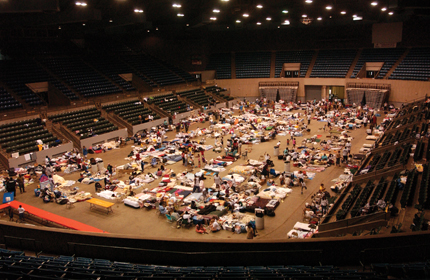
To meet the health-care needs of hurricane evacuees in the Red Cross shelter at the Mississippi Coliseum.
When you think of emergency medicine - especially emergency medicine in the aftermath of a disaster - you normally think of trauma.
But that's not necessarily what Dr. Richard Summers, then-professor of emergency medicine, and the ED staff encountered in Katrina's wake.
And no one was more surprised than Summers himself.

UMMC opened a temporary clinic and pharmacy at the Mississippi Trademart.
"We thought we would have the kind of issues typical of emergency medicine," he said, "so we geared up to treat patients with traumatic injuries.
"We learned a great deal about what we should expect as opposed to what we thought we would expect."
Summers, now associate vice chancellor for research, and his group did see individuals who had sustained injuries while cleaning up after the storm - such as those who had been bitten by snakes or cut by chainsaws. But the cases that overwhelmed the ED in the days following Katrina were much less exotic, yet just as potentially lethal.
"The vast majority of the people we saw had acute exacerbation of chronic diseases who no longer had access to their medications," Summers said. "It
was exacerbated by the fact that we were seeing evacuees as well as our local population who were having all kinds of issues."
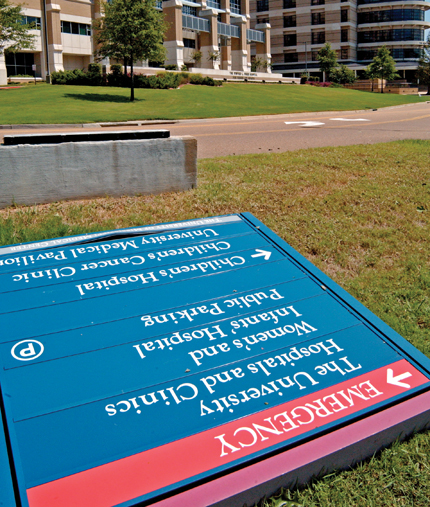
Damage from the hurricane was evident on the UMMC campus.
Foremost was the lack of available medication. The storm had come at the end of a pay cycle, and the loss of power and heightened demand for medication caused pharmacies to close.
"We also had patients who were brought to us because their providers weren't sure where to take them," he said. "There were patients who typically would be housed in a nursing home, for instance, but by default, where are you going to send them but to the ER?"
Some of the most heart-wrenching cases for Summers were those that needed little emergency medical attention at all.
"We had several incidences where we saw people that were in post-traumatic stress situations - they didn't know where their families were, they couldn't contact their children or their spouse," he said. "A lot of them were concerned for their pets.
"While we could deal with their medical problems well enough, that was one thing we couldn't solve."

An interprofessional exercise
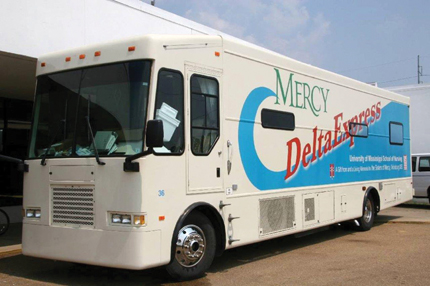
The School of Nursing’s Mercy Delta Express delivers medical and dental care to hurricane evacuees at the Mississippi Trademart
Dr. Rick deShazo sure picked a whale of a time to launch a statewide health care-centered radio show.
Chair of the Department of Medicine at the time, deShazo, the Division of Public Affairs and Mississippi Public Broadcasting personnel were in the middle of launching Southern Remedy, a weekly call-in program on Mississippi Public Broadcasting, when Katrina appeared, providing a major topic of on-air discussion.
And while Red Cross shelters had sprung up like mushrooms after a hard rain, the largest was in the Mississippi Coliseum. The day after the storm, deShazo approached UMMC administrators about the possibility of opening a temporary on-site clinic to alleviate the flow of non-emergent cases to the ED.
deShazo was among a small team from the UMMC Department of Medicine that scouted the situation at the Coliseum. He said he was "blown away" by what he saw.
"There were about 1,000 people, and only one Red Cross nurse who was there for part of the day," he said. "The only thing she could provide was over-the-counter medicines - I'm not sure if she was even licensed to practice in the state.
"The question was, would all of these people end up in our ER? The Red Cross said this was just the first wave of these folks - there were more coming."
With the ED already laboring under the burden, deShazo did a literature search to discover what other institutions had done to address a sudden need for health-care services. At the time, no information was available.
So he and a core group of faculty and staff from the department formed an interdisciplinary team of volunteers from the Division of General Internal Medicine and the specialty divisions, including allergy, and others from the Departments of Family Medicine, Pediatrics and the School of Nursing, to address the situation. After securing two large rooms in the Trademart building on the Mississippi Coliseum fairgrounds, the group recruited numerous other faculty, students, residents and fellows from each of the professional schools on campus.
"We had absolutely no problem getting volunteers," deShazo said. "All it took was UMMC email and word-of-mouth."
The School of Nursing set up its Mercy Delta Express van, equipped with a dental chair, in the Trademart parking lot. Within 24 hours, the volunteers were able to open an on-site diagnostic and treatment center and pharmacy to provide assistance for storm evacuees and Jackson-area residents alike who required immediate assistance.
"We were seeing people with chronic diseases like asthma, heart failure, COPD, diabetes, hypertension and chronic renal failure who had run out of their medicines, and a number of people with acute and chronic psychiatric problems," deShazo said. "We had a number of dialysis patients, and the people in the Nephrology Division and the UMMC Dialysis Center stepped up and made special arrangements to infuse them at the Jackson Medical Mall."
deShazo discussed the Trademart clinic's efforts and took live calls during his Wednesday morning radio program, Southern Remedy, and taped additional spots about the clinic that were broadcast throughout the week. Soon, clinic staff were treating as many local residents as evacuees.
Approximately 200 people were seen in the clinic on the day it opened. No fewer than 100 patients showed up at the clinic on any day, and it stayed open even after the Red Cross closed its shelter at the Coliseum.
"I think it's in keeping with who we are as Mississippians - people really care for each other here and want to help - and it's in keeping with who we are as a school," he said. "It allowed us to see the importance of community service."
The Trademart clinic proved to be the ultimate demonstration of the value of interprofessional education, and it left an indelible mark on the learning environment at UMMC. After the clinic shut down in late September, deShazo and other team members made a proposal to incorporate service learning into the curricula of all health professional schools. Now, students in the Schools of Dentistry, Medicine, Nursing and Health Related Professions must complete a service learning requirement before graduation.
deShazo eventually coauthored two papers on the Trademart clinic; one of them, "A Katrina Experience: Lessons Learned," published by the American Journal of Medicine, serves as a veritable "how-to" guide for organizing a similar facility. In the future, should someone conduct a literature search for how to respond to the medical needs of civilians displaced by a natural disaster, deShazo's paper can serve as a guide.
The Trademart clinic gave a helpful boost to Southern Remedy, which is now broadcast daily and hosted by several UMMC faculty.
"We had planned to do the radio program as a trial to see if it would work," deShazo said. "This (the hurricane) happened and it changed the whole texture of the program. We became inundated with calls.
"It showed the value of the program to public broadcasting. They (MPB) realized it was something that could really provide added value to their lineup And thankfully, UMMC has continued to enthusiastically support the effort as it has grown."

A remarkable response
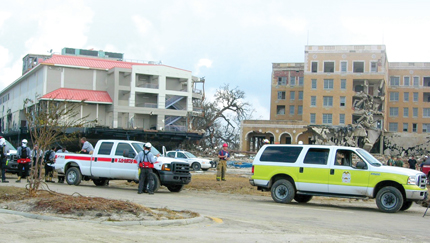
Katrina search and rescue vehicles park outside a damaged casino on the Mississippi Gulf Coast.
As reports of hospital closures in south Mississippi came rolling in, Dr. Dan Jones began to understand the scale of damage Katrina had wrought.
"We realized, with the wind damage and associated thunderstorms and tornadoes, that most of the hospitals south of us would be severely hampered in their ability to respond," said Jones, former vice chancellor for health affairs. "We knew we would have to step in to care of those patients.
"The response from our staff was quite remarkable. Many elected to stay around the clock and work longer hours than usual, sleep and eat at the Medical Center, so they could be there the next day for the next shift to begin."
In the aftermath of the storm, Jones remained in constant communication with federal and state agencies, the governor's office and the state's Congressional delegation, staying abreast of Mississippi's health-care needs and the Medical Center's ability to provide for them. But as the week wore on, Jones was confronted with an entirely unexpected challenge: keeping the Medical Center staffed.
The closure of daycare centers was a particular burden for employees with small children. The Medical Center had never operated a daycare center before, but students from the School of Nursing, the School of Health Related Professions and other volunteers came together to care for toddlers while their parents worked.
Mud and debris coat the interior of the Hancock County Medical Center in Bay St. Louis.
"There was remarkable support for those things that you wouldn't ordinarily think were essential to keeping the Medical Center running," said Jones, director of clinical and population science for the Mississippi Center for Obesity Research and interim chair of the Department of Medicine. His most difficult task by far, though, was resolving the gasoline shortage for Medical Center employees.
From the day the storm had hit, Jones had been requesting gasoline access from federal and state representatives, who were sympathetic but nevertheless unable to provide the needed reserves. After several days, the lack of available fuel was beginning to threaten UMMC's ability to remain fully staffed.
At the urging of his staff, Jones decided to make an appeal to the business community. He contacted Bill Lampton, president of the Asphalt Division of Ergon, a petroleum-related enterprise in Jackson.
"He said, 'We have access to gasoline and to trucks to bring you the fuel. Just tell me where you want us to take it,'" Jones said. "My response was, 'I have no idea.'"
The Jackson Chamber of Commerce helped Jones secure a local gas station that had recently closed, Medical Center leadership instituted a system to make gasoline available to its employees, and in a matter of hours, UMMC was in the fuel business.
"It was a very difficult time," Jones remembered, "but the commitment everyone at the Medical Center shared to support patient care was truly remarkable. You kind of expect physicians and nurses to understand the need for that, but from every quarter of the Medical Center - from Food and Nutrition Services to Campus Police to Laundry Services to Physical Facilities - individuals were motivated to do their jobs, even in the most difficult of circumstances.
"It was truly a rich experience to see how the Medical Center managed to respond to individuals in need."
It was also an opportunity for the Medical Center's leader to put into practice what he had been preaching. Not long after giving a pep talk to ED staff, urging them to continue doing whatever was necessary to take care of their patients, Jones got a call from Jonathan Wilson.
"Don't you live in Hazlehurst?" Wilson asked. "We've got a patient ready for discharge, but he has no way to get home. Would you be willing to take him?"
"Of course, I was very happy to take that patient home to Copiah County and fulfill my responsibility, to do my part as I had described in that meeting," Jones said.



